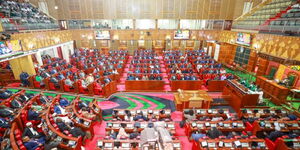Treasury Cabinet Secretary John Mbadi has warned that all government agencies, including county governments, will strictly continue using the Electronic Government Procurement (eGP) system, dismissing reports that Parliament had revoked it.
Speaking on Thursday during the 13th Development Partnership Forum on enhancing effective development cooperation at Deputy President Kithure Kindiki's residence at Karen in Nairobi, Mbadi firmly dismissed claims that the system had been scrapped.
Mbadi was responding to claims and concerns raised by the Council of Governors on how the devolved units had faced challenges with the new system that was launched by the Treasury to address the integrity issues surrounding the manual procurement system.
"One contentious debate that is being pushed outside there is that Parliament revoked the e-procurement system. I want to be very categorical that we are not going to allow the use of the manual system, and this should sound as a warning to the county governments," Mbadi stated.
Cabinet on e-Procurement
He further stressed that only the Cabinet has the authority to revoke the system, not Parliament.
According to the CS, some counties, as well as ill-intentioned government officials within ministries, state departments, and agencies (MDAs), have been attempting to secretly reintroduce the manual procurement system despite the Treasury’s directive that all must migrate to the digital platform.
The CS attributed the resistance to vested interests by individuals keen on exploiting loopholes in the manual system.
"Only the Cabinet can revoke e-Procurement, not Parliament. And therefore our position remains. Why is it that all the circulars that I have issued, such as the ones on zero-based budgeting and use of IFMIS and other directives, no one has a problem with, but when we issue a similar one on procurement, then suddenly everyone seems to have a problem?" Mbadi posed.
"People are having a problem with the e-procurement due to vested interests. They still want to go to the manual and manipulate the system where they pluck papers and tender documents. That one we are not going to allow," he warned.
About the System
The government introduced the e-procurement system under the Integrated Financial Management Information System (IFMIS) to address long-standing loopholes in public procurement.
Before its rollout, manual tendering processes were prone to manipulation, inflated pricing, and ghost suppliers, costing taxpayers billions.
E-procurement allows real-time tracking of tenders, bidders, and contract awards, creating a digital audit trail that limits room for interference. It also enhances efficiency by cutting delays, reducing paperwork, and saving costs through open competition.
Budgetary Allocation
During the June budget reading, the government proposed an allocation of Ksh700 million towards the implementation of the Electronic Government Procurement (eGP) system.
Mbadi, while presenting the 2025/2026 budget estimates before the National Assembly, stated that the funds would specifically support the rollout of the programme.
According to the CS, the system is designed to address and seal corruption loopholes in procurement processes across government agencies.












